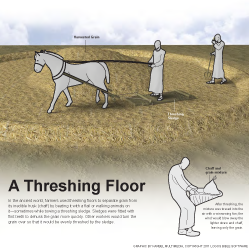18:1–34 This account of Jehoshaphat’s alliance with Ahab and the prophecy of Micaiah closely follows the account in 1 Kgs 22:1–40, with changes only in the introduction and conclusion. Those differences reflect the Chronicler’s focus on Jehoshaphat and the implications of these events for his reign. |
18:1 he became son-in-law Jehoshaphat’s firstborn son, Jehoram, married a daughter of Ahab (2 Chron 21:6).
(2 Chron 21:6).
18:2 and urged him The account in Kings shows Ahab persuading Jehoshaphat to take back Ramoth-gilead from the Syrians (see 1 Kgs 22:3 and note).
18:3 my people are as your people See 1 Kgs 22:4 and note.
18:4 Seek first of all the word of Yahweh Jehoshaphat shows his concern for seeking God (see note on 2 Chron 11:16). See 1 Kgs 22:5 and note.
18:5 four hundred men Based on Jehoshaphat’s response, these probably were prophets of Baal or Asherah (compare 2 Chron 18:6; 1 Kgs 18:19).
18:6 prophet of Yahweh Jehoshaphat was not satisfied with the prophets Ahab brought out. He specifies that he wants to seek guidance from a prophet of Yahweh.
18:7 I hate him Instead of listening to Micaiah’s prophecies, Ahab hated him for not giving him good reports.
18:9 the threshing floor See 1 Kgs 22:10 and note.
were prophesying Indicates an ecstatic frenzy common in ancient prophetic practice.
18:10 Zedekiah One of the 400 prophets.
horns of iron See 1 Kgs 22:11 and note.
18:12 with one voice The Hebrew phrase here denotes a sense of “one mouth.” The messenger wanted Micaiah to know that the false prophets were united in their favorable prophecy.
18:13 As Yahweh lives Signifies an oath. Swearing on the name of Yahweh was the strongest form of swearing an oath. To be proven wrong would make the person taking the oath a blasphemer.
18:15 nothing except the truth Ahab is skeptical, due to his past experience with unfavorable prophecies from Micaiah (2 Chr 18:7).
18:16 that had no shepherd See 1 Kgs 22:17 and note.
18:17 I not say to you See 2 Chron 18:7 and note.
18:18 all the host of heaven Refers to God’s divine council (see Psa 82:1 and note).
18:19 Who will entice Ahab the king of Israel that he would go up and fall at Ramoth-Gilead? See 1 Kgs 22:20 and note.
18:20 a spirit came forth See 1 Kgs 22:21 and note.
18:21 will be a lying spirit The Hebrew text here literally reads “a spirit of deception.”
18:23 struck Micaiah on the cheek A gesture meant for humiliation and rebuke. Zedekiah reacts harshly to the claim that he had spoken with a spirit of deception.
18:24 a private room Refers to hiding from an invasion or battle (as Ben-hadad did in Aphek; 1 Kgs 20:30).
18:26 Put this one into the prison house See 1 Kgs 20:7 and note.
until I return in peace Signals that Ahab has chosen to believe his 400 prophets.
18:27 Yahweh has not spoken with me See 1 Kgs 22:28 and note.
18:29 disguised himself Likely as a precaution, to guard against the possibility that he might be killed as Micaiah foretold (see 2 Chron 18:19).
18:31 and Yahweh helped him This line is not in the 1 Kings account (compare 1 Kgs 22:32). The Chronicler emphasizes that God rescued Jehoshaphat in response to his cries. The emphasis on God answering prayer is seen throughout Chronicles (2 Chron 6:19; compare 1 Chr 4:10 and note; 1 Chr 5:20; 21:26).
18:33 drew the bow at random A violation of the Syrian king’s command to fight only with the king of Israel.
18:34 propped up in the chariot See 1 Kgs 22:35 and note.
he died at the time of the going down of the sun The account in 1 Kings gives further details surrounding the death of Ahab and the dishonor he faced (1 Kgs 22:37–38).

|
About Faithlife Study BibleFaithlife Study Bible (FSB) is your guide to the ancient world of the Old and New Testaments, with study notes and articles that draw from a wide range of academic research. FSB helps you learn how to think about interpretation methods and issues so that you can gain a deeper understanding of the text. |
| Copyright |
Copyright 2012 Logos Bible Software. |
| Support Info | fsb |
 Loading…
Loading…

